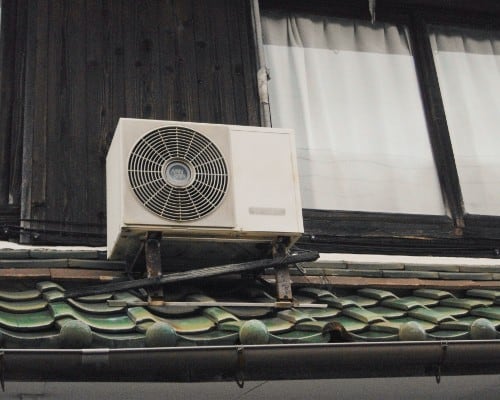The air in your home should smell pleasant or familiar, like cooking, food or even flowers–not like mildew! If you notice a moldy smell coming from your HVAC system, it may indicate a problem with your system.
Even after you’ve cleaned your unit, a lingering mildew smell from AC units will decrease your home’s air quality and overall comfort. Fortunately, there are practical solutions to deal with this problem and eliminate the mildew smell in your air conditioner.
In this article, we will look at what can cause this smell, and how to eliminate a mildew odor from your air conditioner.
If you need professional help finding and fixing the root cause of the mildew smell in your AC or need to install a new air conditioner, contact the River Valley Air Conditioning team today.
What’s causing the mildew smell in your AC unit?
Before you start trying to get rid of the smell, it’s good to know what’s causing it in the first place, so you can prevent it from coming back.
Mildew, like most mold types, thrives in damp, humid environments. Moisture buildup in your air conditioner or ductwork, creates the perfect environment for mildew to start growing.
Where the moisture comes from can vary from home to home. In some buildings, this can happen as a result of factors like a clog somewhere in the condensate drains, or because you live in a region with high humidity. As the mildew spreads, it emits a distinct odor that can fill your entire house.
With summer naturally having higher humidity levels and homeowners using their air conditioners more often, it’s common to notice mildew growth then.
Common Causes of Mildew Smells
By looking at what is causing the mildew smell in your home, you can better understand how to prevent it. Here are some potential causes:
Improper Drainage and a Clogged Condensate Line
For an AC system to operate properly, you need to have proper drainage, especially during the summer months. When your AC runs for long periods of time, the outdoor heat can cause condensation to form on the air conditioner and its pipes. If the condensate line – the main condensation drain – gets blocked up, mildew and other forms of mold can form.
You can keep your condensate drain free of water buildup by routinely inspecting and cleaning it.
Clogged and Dirty Air Filters
If your AC smells like mildew, it may be a clogged air filter. Air filters clear out the dust and debris from the air, regardless of whether it’s flowing in or out. When the filter gets clogged, it can start restricting air instead. In addition to stopping air, it can prevent humidity from dispersing properly throughout your house as well, contributing to a damp environment.
As mentioned, a damp environment creates prime real estate for mildew to grow. Since airflow is still restricted, the musty smell of mildew can easily leak out and spread through your home.
Closed Vents and Bad Ventilation
Mildew odors in an AC system can also form as a result of inadequate ventilation. Poor air circulation can cause the air to become stagnant, fostering mildew growth. Add increased humidity to that and you have a breeding ground for mold.
This is especially common in places with poor airflow, like closets, and enclosed spaces without windows. Maintaining adequate ventilation by leaving vents open and unblocked can help prevent mold growth and eliminate odors.
Possible Solutions to Mildew Smells
If you’re noticing mildew smells in your home or office, it’s important to find the cause and fix it as soon as possible to bring back and maintain clean and healthy air quality. There are several effective ways to solve this issue:
Natural Remedies
Many homemade remedies are incredibly effective for cleaning and removing the mildew odor from your air conditioner. Vinegar, for example, has natural disinfecting properties and can be quite useful in removing smells if used carefully.
To use vinegar:
- Mix and spray a solution of equal parts white vinegar and water onto any mildew-covered AC parts you can reach.
- Let the solution sit for a few minutes, then wipe the part clean.
Thanks to the acidity of the vinegar, not only will the mildew smell disappear, but your AC unit should stay clear of mold.
Similarly, baking soda is another great natural cleaner.
To use baking soda:
- Sprinkle baking soda on the surface
- Let it sit for several hours or overnight. The baking soda should absorb the odors while also cleaning the surface underneath.
- Vacuum or wipe away the baking soda and the smell should be gone.
Regularly Cleaning Your AC
Another way to get rid of the mildew smell from ACs is to keep it clean and service the system as often as possible. Beyond professional maintenance appointments, regularly check your AC air filters and replace them as needed. The better the air can flow, the lower the chance that mildew can grow.
Next, focus on keeping the condensate line clean. Though it only deals with water, dirt and debris can build up and clog. Eventually, that clog can cause water to build up and, soon, mildew to grow.
A vinegar and water solution can be especially useful here and can sit in your AC’s drain line to eat at the clog without damaging the metal around it. As mentioned, this helps remove any mildew and prevent it from returning.
Also, ensure there is no excess moisture or mildew in or around the air conditioner. Good ventilation and quickly fixing water leaks or extra dampness can be a big stem. Additionally, to avoid the buildup of dirt, dust, and mold, regularly check and clean the evaporator coil, blower fan, and other parts of the AC system.
Get Your AC Checked and Inspected by Professionals
If you have tried all of the above steps and still notice a mildew smell from your AC unit, you may need to call for professional help. A thorough AC cleaning and tune up done by an HVAC technician from River Valley can help find any underlying problems like clogs and helps to guarantee a proper fix.
Our specialists have the necessary training, knowledge, and tools to thoroughly clean mold or mildew growth and disinfect the system. We can help get to those hard-to-reach areas, so you’re guaranteed a solution.
Keep Mildew Away with Preventative Maintenance.
Once the smell is removed from your air conditioner, to keep it away, it’s good to maintain it regularly. As mentioned, make sure to keep up with your air conditioner’s cleaning and to change the filters at least once every two months. Keep the space around the AC unit dry, installing a dehumidifier if necessary.
If you’re still worried about mold or mildew, air purifiers are a great way to add a bit more cleaning power to your cooling system. In some cases, you can even install UV germicidal lights in your HVAC system. These devices can improve the air’s cleanliness and lower the chance of mold and mildew growth.
Need a professional checkup? Contact River Valley.
Getting rid of a moldy smell from your AC unit starts by knowing the causes. Routine cleaning and maintenance are great ways to stop mildew growth and prevent it from returning. Even a little cleaning – with natural or chemical cleaners – can go a long way to solving and removing the smell.
If you need any professional help with any weird smells from your HVAC unit or general HVAC help, contact the team at River Valley Air Conditioning!

